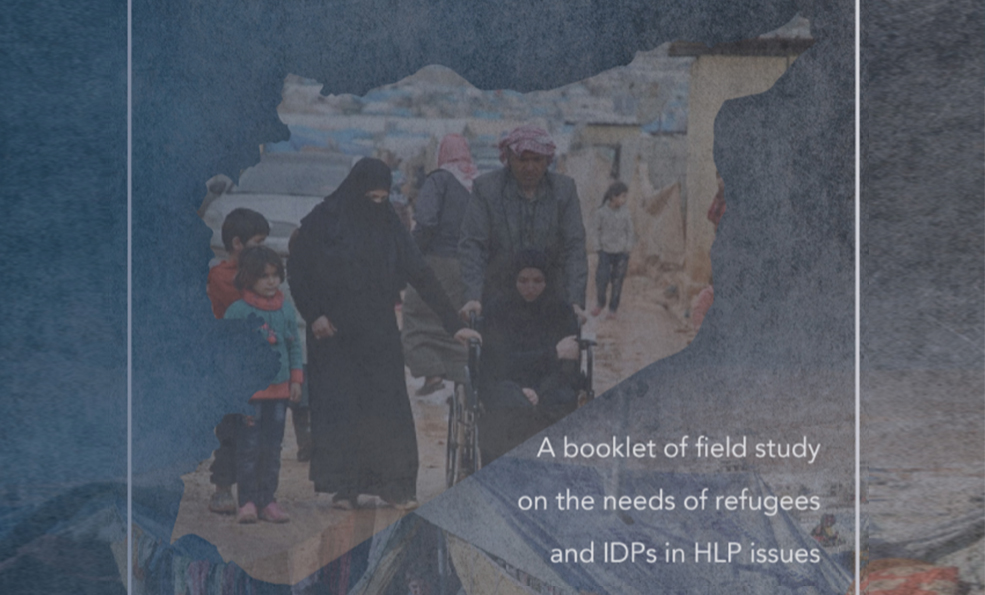Executive summary
Based on the importance of real estate ownership in the lives of individuals, and in order to enable IDPs and refugees to regain their rights and enable them to return to their areas of origin and preserve their rights and inasmuch the difficulties and difficult living conditions, we conducted the current study in order to determine the reality of the daily life of IDPs and refugees in the areas where they reside Knowing their needs and providing solutions that can help improve their living conditions, as well as determining the size and damage to real estate rights they have in their areas of origin and their ability to act on that property. The study aims at examining the most prominent attacks on the real estate properties of individuals and their ability to claim compensation for such damages and highlighting the most prominent laws that were issued during the crisis period that pose a threat to the rights of individuals and the extent of awareness and knowledge of IDPs and refugees. The laws and proposals that can mitigate its negative effects and help restore Syrians’ rights in a way that facilitates their voluntary return to the areas from which they were displaced have been compromised.
The study was conducted in August and September of 2019 in Syria and Turkey.In Syria, the governorates of Aleppo and Idlib were covered in Idlib, Jericho, Orm al-Joz, Kafr Takharim and Maaret al-Nu’man. Dara Azza in the western countryside of Aleppo and Azaz and Afrin cities in the northern countryside of Aleppo. In Turkey, the study included the states of Urfa, Gaziantep and Hatay. During the study, 539 interviews with IDPs and refugees were conducted in different areas of the study using an electronic questionnaire including closed questions. The distribution of refugees and IDPs in each area was taken into account Respondents’ diversity in terms of educational level, origin, sex and age were also taken into consideration during the study. Six focused dialogue sessions and 20 expert interviews were conducted with legal professionals who have knowledge of property laws. Real Estate where the guide was used featuring in-depth questions of their own.
The study showed a decline in the standard of living, especially for the displaced residents within the liberated areas due to the lack of basic services such as water, electricity and sanitation in the camps and the low level of medical and educational services provided and the high cost of living in the absence of opportunities for work and high prices, including house rents, As for refugees, they suffer primarily from the difficulty of obtaining the necessary permits for travel or work.
As for real estate properties, the results of the study indicate that the vast majority of refugees and displaced people still retain their real estate properties in their original areas from which they were abandoned, knowing that most of them are not able to carry out legal actions from buying and selling of these properties or completing the void transactions and transferring the property due to the security restrictions imposed On these transactions and the inability of many of them to travel to the areas in which real estate resides, this is the laws that the Syrian regime issued during the conflict period, especially Law No. 10 of 2018 and the Anti-Terrorism Law No. 19 of 2012 and The creation of Terrorism Court No. 22 of 2012 creates a real threat to the ability of the displaced and refugees to maintain their real estate properties, knowing that most of them have no knowledge or awareness of the content of those laws and the texts contained within them.
The results of the study also show the inability of the majority of the displaced and refugees at the present time to extract personal identification documents from personal identity cards and passports and their inability to document the changes in their personal status of marriage, divorce, death and birth with the official state departments, and as for the barriers of return of the displaced to their areas It is represented by the lack of adequate security conditions for return and the fear of being arrested or attacked by the Syrian regime forces and its security agencies and the confiscation or destruction of property of many refugees and displaced persons and their inability to claim compensation for damages that are not Their real estate was added to the lack of basic services due to the enormous damage to infrastructure.
Accordingly, the study recommends the necessity of working to improve the current living conditions of Syrian refugees and internally displaced people by seeking to provide the main services in the areas in which they reside, creating job opportunities that guarantee them to obtain an income that covers their monthly expenses and improving the conditions of the housing in which they reside, especially for residents within the camps and can be done This is done by providing rental allowance cash and building housing complexes for the displaced and refugees.
To download the study, click here
